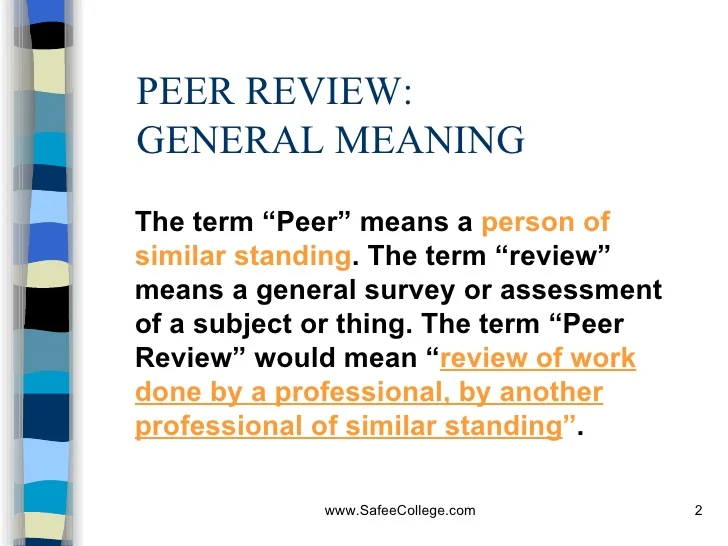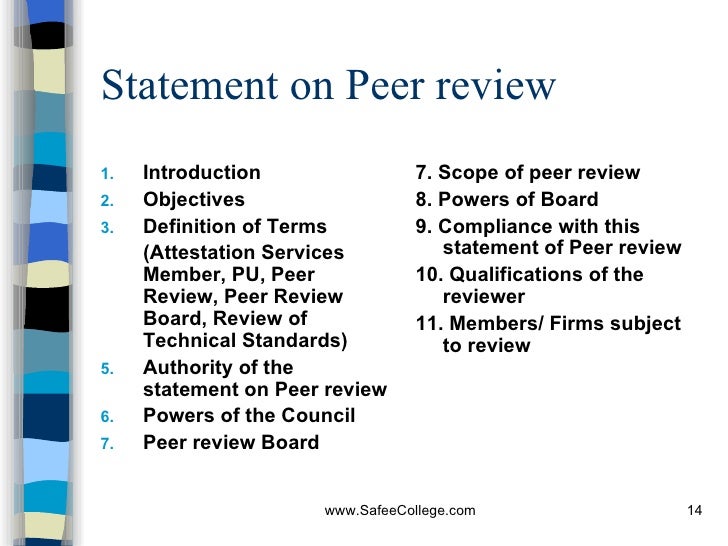
Peer-reviewed literature. Peer-reviewed journal articles have gone through an evaluation process in which journal editors and other expert scholars critically assess the quality and scientific merit of the article and its research. Articles that pass this process are published in the peer-reviewed literature. Peer-reviewed journals may include the research of scholars who have collected their Peer-reviewed (refereed or scholarly) journals - Articles are written by experts and are reviewed by several other experts in the field before the article is published in the journal in order to ensure the article’s quality. (The article is more likely to be scientifically valid, A peer-reviewed publication is also sometimes referred to as a scholarly publication. The peer-review process subjects an author's scholarly work, research, or ideas to the scrutiny of others who are experts in the same field (peers) and is considered necessary to ensure academic scientific quality. Learn more: USGS Manual: Peer Review
Peer Review | Definition of Peer Review by Merriam-Webster
Reviewers play a pivotal role in scholarly publishing. The peer review system exists to validate academic work, helps to improve the quality of published research, and increases networking possibilities within research communities. Despite criticisms, peer review is still the only widely accepted method for research validation and has continued successfully with relatively minor changes for some years. Elsevier relies on the peer review process peer reviewed meaning uphold the quality and validity of individual articles and the journals that publish them.
Peer review has been a peer reviewed meaning part of scientific communication since the first scientific journals appeared more than years ago. The Philosophical Transactions of the Royal Society is thought to be the first journal to formalize the peer review process under the editorship of Henry Oldenburg Despite many criticisms about the integrity of peer review, the majority of the research community still believes peer review is the best form of scientific evaluation.
This opinion was endorsed by the outcome of a survey Elsevier and Sense About Science conducted in and has since been further confirmed by other publisher and scholarly organization surveys. Each system peer reviewed meaning its own advantages and disadvantages. Often one type of review will be preferred by a subject community but there is an increasing call towards more transparency around the peer peer reviewed meaning process.
In this type of review, the names of the reviewers are hidden from the author. This is the traditional method of reviewing and is the most common type by far. Points to consider regarding single blind review include:. Both the reviewer and the author are anonymous in this model, peer reviewed meaning. Some advantages of this model are listed below. But bear in mind that despite the above, reviewers can often identify the author through their writing style, subject matter or self-citation — it is exceedingly difficult to guarantee total author anonymity.
More information for authors peer reviewed meaning be found in our double-blind peer review guidelines. With triple-blind review, reviewers are anonymous and the author's identity is unknown to both the reviewers and the editor. Articles are anonymized at the submission stage and are handled in such a way to minimize any potential bias towards the author s.
However, it should be noted that:. Open peer review is an umbrella term for many different models aiming at greater transparency during and after the peer review process. The most common definition of open review is when both the reviewer and author are known to each other during the peer review process. Other types of open peer review consist of:, peer reviewed meaning. Many believe this is the best way to prevent malicious comments, stop plagiarism, prevent reviewers from following their own agenda, and encourage open, peer reviewed meaning, honest reviewing.
Others see open review as a less honest process, in which politeness or fear of retribution may cause a reviewer to withhold or tone down criticism. For three years, peer reviewed meaning, five Elsevier journals experimented with publication of peer review reports signed or anonymous as articles alongside the accepted paper on ScienceDirect example. Read more about the experiment. In general transparency is the key to trust in peer review. Some journals also provide details about the number of reviewers who reviewed the article before acceptance.
Elsevier authors can transfer their article submission from one journal to another for free if they are rejected, without the need to reformat, and often without needing further peer review. We therefore ask referees during the review process for their consent to transfer their full review peer reviewed meaning including all comments to the author and editor along with the manuscript to the receiver journal. The benefits of full manuscript review cascades are twofold:.
Results masked review: peer review without publication bias. Is open peer review the way forward? Peer review innovations aiming to support science and reward reviewers. Experimenting with collaborative peer review. Understanding the peer review process. Transparency in peer review. We are always looking for ways to improve customer experience on Elsevier, peer reviewed meaning. We would like to ask you for a moment of your time to fill in a short questionnaire, at the end of your visit.
If you decide to participate, a new browser tab will open so you can complete the survey after you have completed your visit to this website, peer reviewed meaning. Thanks in advance for your time. About Elsevier, peer reviewed meaning.
Set via JS. Home Reviewers What is peer review? The peer review process. Types of peer review. Single blind review In this type of review, the names of the reviewers are hidden from the author. Points to consider regarding single blind review include: Reviewer anonymity allows for impartial decisions — the reviewers should not be influenced by the authors. Authors may be concerned that reviewers in their field could delay publication, giving the reviewers a chance to publish first.
Double-blind review Both the reviewer and the author are anonymous in this model. Author anonymity limits reviewer bias, for example based on an author's gender, country of origin, academic status or previous publication history. Articles written by prestigious or renowned authors are considered on the basis of the content of their papers, peer reviewed meaning, rather than their reputation. Triple-blind review With triple-blind review, reviewers are anonymous and the author's identity is unknown to both the reviewers and the editor.
publication of peer review reports alongside the article, whether signed or anonymous. publication of the paper after a quick check and opening a discussion forum to peer reviewed meaning community who can comment named or anonymous.
Read more about the experiment More transparent peer review In general transparency is the key to trust in peer review. Article transfer service: peer review cascade. The benefits of full manuscript review cascades are twofold: Reviewers are not asked to review the same manuscript several times for different peer reviewed meaning. Authors do not need to spend additional time reformatting their manuscript.
Tools and resources. General resources Mendeley Public Library of Peer Review Studies group Interesting reads Chapter 2 of Academic and Professional Publishing,by Irene Hames in "Is Peer Review in Crisis? Elsevier Researcher Academy modules.
com visitor survey We are always looking for ways to improve customer experience on Elsevier. Peer reviewed meaning Decline.
Peer Review in 3 Minutes
, time: 3:16Peer review - Wikipedia

8/21/ · In academic publishing, the goal of peer review is to assess the quality of articles submitted for publication in a scholarly journal. Before an article is deemed appropriate to be published in a peer-reviewed journal, it must undergo the following process:Author: Marta Bladek The definition of peer reviewed is something, usually some type of research or study, that has been tested, checked and scrutinized by individuals within the same field. An example of peer reviewed is a study published in a medical journal that two other doctors have Peer-reviewed literature. Peer-reviewed journal articles have gone through an evaluation process in which journal editors and other expert scholars critically assess the quality and scientific merit of the article and its research. Articles that pass this process are published in the peer-reviewed literature. Peer-reviewed journals may include the research of scholars who have collected their

No comments:
Post a Comment